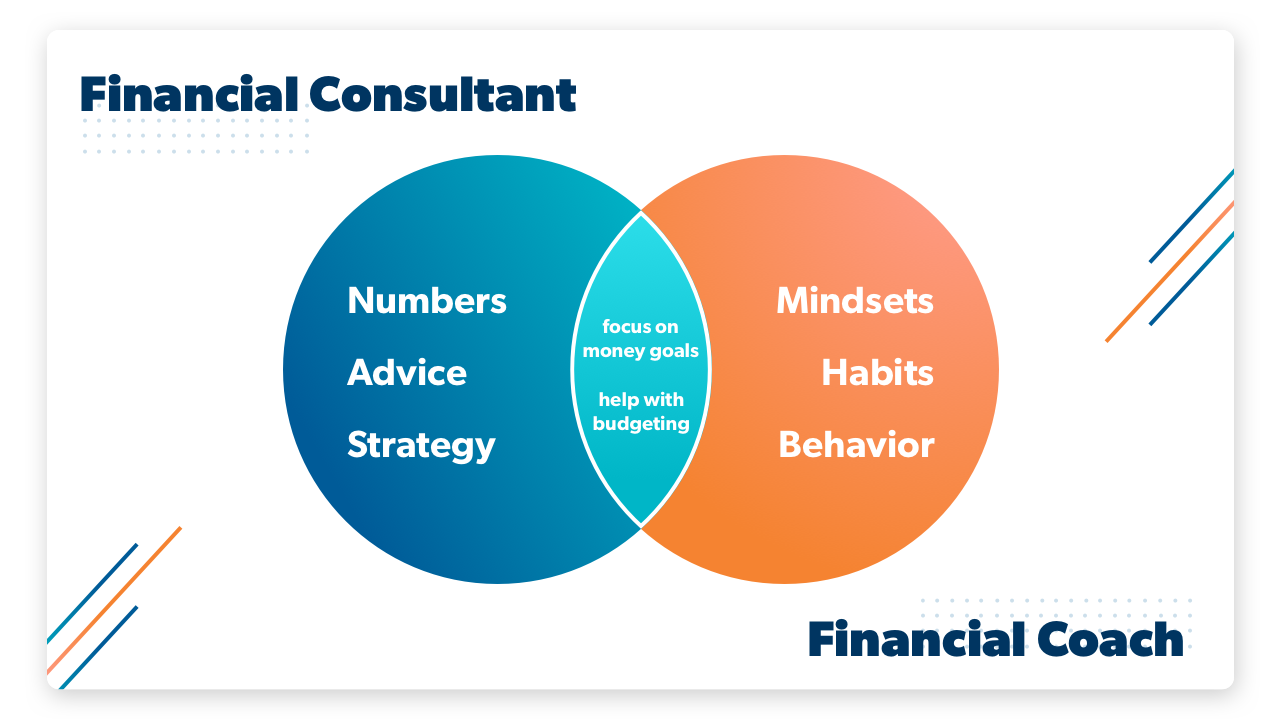
Financial consultants. You’ve heard of them—whether it’s from a Facebook ad, a tv commercial, or the Charles Schwab magnet on your aunt’s fridge. But do you even know what a financial consultant is or what they do?
Simply put, financial consultants help people figure out the best strategy for their money situation. And that includes anything from helping a business with investment banking to showing someone how to get that retirement they daydream about.
But when it comes to crushing your money goals, how do you know if you need a financial consultant or someone else to help you do it? Let’s find out.
What Is a Financial Consultant?
Financial consultants are professionally trained to give you (or your business ) advice about specific money issues. They help with a wide range of topics, like showing someone how to invest in the right places or advising businesses on how to manage their funds and bonds.
Consultants largely belong to consulting firms (think Morgan Stanley or Charles Schwab), although, some are self-employed.
And while most consultants studied business, finance or something like that in college, they usually have certifications too. It depends on what their employer requires or what they specialize in.
So, if you need help with managing bonds (fancy), you’ll need a financial consultant with a Series 65 license. Or for guidance on estate planning, you’ll want a consultant who’s a CFP (Certified Financial Planner).
All-in-all, if you’ve got a specific money issue, there’s probably a financial consultant out there who’s got a certification for it.
What Does a Financial Consultant Do?
A consultant looks at all of your assets—bank accounts, investments, the whole nine yards—to get a full picture. Then, they sit down with you and propose a strategy for reaching your goal.
Let’s say you need some help on a profit and loss analysis for your business. A financial consultant would meet with you to understand your situation and then set up more meetings to come up with a game plan.
Or maybe you want to figure out the best strategy for buying a home. A financial consultant would draw up a plan and give advice on what money or assets you should use to buy your home. How many sessions you have depends on the consultant and your situation.
Financial Consultant vs. Financial Advisor vs. Financial Coach
Financial Consultant:
It’s safe to say that financial consultants are numbers people—and honestly, where would we be without our numbers people? They look at your entire situation, with your goal in mind, and then create a strategy to help you win.
Here’s the thing. A financial consultant can give you the plan to accomplish your goal, and they might even be available to answer questions or check in on you periodically. But their specialty isn't in helping you change attitudes or behaviors around the way you handle money. And that’s a big area to keep in check, considering personal finance is 80% behavior and only 20% head knowledge. But more on that in a minute.
Now, there are a lot of great consultants out there. But before you hire one, do your research. Some aren’t required by law to keep your goals front of mind (that’s a non-fiduciary advisor). There’s nothing to stop them from charging you unreasonable commissions or advising you to buy one of their products, even if it doesn’t benefit you. So, when you’re shopping for a consultant, you want to look for a fiduciary consultant—aka a consultant who’s legally bound to advise in your best interests.
Financial Advisor:
This is where things can get a little confusing. Financial consultants, financial advisors, financial wellness advisors (whatever you want to call them) are somewhat similar in function. You might see advisor more than you see consultant.
Market chaos, inflation, your future—work with a pro to navigate this stuff.
The only time title comes into play is when it might refer to the consultant’s certification or specific function. As discussed earlier, Certified Financial Planners are a type of consultant that specializes in a specific service (like tax work or estate planning).
Financial Coach:
Both financial consultants and financial coaches help you crush your money goals—but in very different ways. Financial consultants focus on your money’s behavior (that’s the 20% head knowledge we were talking about), whereas financial coaches focus on your behavior with money (that’s the other 80%). While consultants are looking at the numbers and the plan, coaches are guiding you, cheering for you, and keeping you on the straight and narrow. Not only can a coach help you prioritize and tackle debts or get you and your spouse on the same page with money, they may end up on your Christmas card list because they're so relational.
Consultants will define your what—what you want. Coaches will define (and remind you of) your why—the reason you made your goal in the first place. And don’t underestimate the power of your why. It’s the fire in your bones that gets from where you are to where you want to be.
Now, let’s make one thing clear: Financial consultants and financial coaches don’t compete with each other. In a lot of ways, a coach can be the bridge to a consultant. Coaches help you pinpoint and change behaviors so when it comes time to work the plan a consultant gives you, you’re ready to nail your goal. And financial coaches often send their clients to consultants to get help with certain issues (like estate planning or tax work). Basically, coaches play the Yoda role in people’s financial journeys.
Think of a financial coach as your personal trainer and a financial consultant as your workout routine. Lifting weights gets you results. But having a trainer beside you, showing you the right techniques and helping you keep your head in the game when you feel like quitting can get you to your goal.

Who to Choose for Your Team
At the end of the day, everyone’s situation is different. Think about where you want and need to start. Do you need help with your motivation to get to your goal? A coach can help with that, and they can help change the root of your problem: your mindset. Do you want to know what the heck you need to do with your investments? A consultant or advisor would be a great resource for that.
Now, a coach can't help you with your business goals or long-term investments, like our network of SmartVestor Pros can. But if you’re a stressed-out parent who’s scraping money together to cash flow your kid’s college or wedding, you need a coach. If you’re neck-deep in debt and considering bankruptcy, you (absolutely) need a coach. If you just don’t know where the road to retirement leads, a coach can help you find your next step for getting there.
So, if you’ve got a money problem—or a money goal—and want real, lasting change, let us help. Reach out to our network of coaches and start the path to financial peace.
Make an Investment Plan With a Pro
SmartVestor shows you up to five investing professionals in your area for free. No commitments, no hidden fees.
This article provides general guidelines about investing topics. Your situation may be unique. If you have questions, connect with a SmartVestor Pro. Ramsey Solutions is a paid, non-client promoter of participating Pros.


